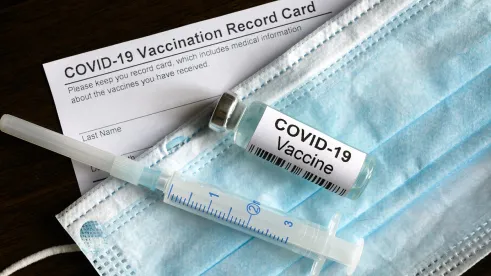The Centers for Medicare and Medicaid (CMS) released a new Interim Final Rule (IFR)[1] on Nov. 4, 2021 that requires certain healthcare staff at facilities that participate in the Medicare and Medicaid programs to receive the COVID-19 vaccination. Below is a high-level summary of the new rule established by CMS:
-
Applicability. The vaccination requirement applies to all eligible staff working at a facility that participates in the Medicare and Medicaid programs,[2] regardless of clinical responsibility or patient care and worksite locations.[3] This includes, but is not limited to administrative staff, facility leadership, volunteer or other fiduciary board members, housekeeping and food services.[4]
-
Vaccination Process & Requirements. By Dec. 6, 2021 staff at all healthcare facilities where the regulation applies must have received their first dose of a two-shot series or a single dose of a one-shot vaccine. By Jan. 4, 2022, all staff must be completely vaccinated. CMS defines “full vaccination” as 14 days after receipt of either a single-dose vaccine (i.e. Johnson & Johnson vaccine) or 14 days after the second dose of a two-dose primary vaccination series (i.e. Pfizer or Moderna vaccines).[5] The IFR is not requiring the “booster dose” in order for staff to be considered “fully vaccinated.” Unlike the OSHA mandate requirements, there is no testing requirement/alternative for unvaccinated staff; staff must either have a valid exemption or be vaccinated.
-
Exemptions. Healthcare facilities must generally provide exemptions to a COVID-19 vaccine mandate for those employees with a disability, medical condition, or a sincerely held religious belief preventing vaccination. In instances where a staff member meets the requirements for an exemption, the facility is expected to develop a process for implementing additional precautions to mitigate the transmission and spread of COVID-19.
-
Documentation. Healthcare facilities are required to track and securely document the vaccination of each staff member. As for what constitutes adequate documentation of vaccination, the following are acceptable: CDC COVID-19 vaccination record card (or legible photo of the card); documentation of vaccination from a healthcare provider or electronic health record; or state immunization information system record. This vaccine documentation must be kept confidential and stored separately from an employer’s personnel files. Healthcare facilities must also have a process for collecting and evaluating such requests, including tracking and securing documentation provided by those staff who have requested exemption, the facility’s decision on the request, and any accommodations that are provided.
-
Enforcement & Penalties. CMS will utilize State Survey Agencies to review compliance with the IFR through standard recertification and complaint surveys. Although the IFR does not identify specific penalties for non-compliance, to the extent a healthcare facility is found to be noncompliant, CMS is expected to use enforcement tools such as civil money penalties, denial of payment for new admissions, or termination of the Medicare/Medicaid provider agreement.
This summary is intended to help healthcare employers plan and prepare for compliance with the new rule. However, it is not intended to address all details of and employer responsibilities under the rule.
FOOTNOTES
[1] This rule is meant to address the risk unvaccinated healthcare staff poses to patient safety. This new rule is expected to affect 76,000 providers and apply to 17 million healthcare workers.
[2] Healthcare facilities that are covered include, but are not limited to, ambulatory surgical centers, hospices, hospitals, long-term care facilities, home health agencies, comprehensive outpatient rehabilitation facilities, critical access hospitals, home infusion therapy suppliers, and rural health clinics/federally qualified health centers.
[3] The requirement does not affect healthcare workers who work remotely full time and have no direct contact with patients or other staff.
[4] CMS has also indicated that the vaccination requirements may under the circumstances apply to non-hospital employees when considering the frequency of presence, services provided, and proximity to patients and staff. For example, a construction crew working on a project at facility and whose members share facilities used by staff, patients, and visitors would be subject to these requirements as well.
[5] Although an individual is not considered fully vaccinated until 14 days after the final vaccination dose, staff who have received the final vaccination dose of the two-dose series by Jan. 4, 2022 are considered to have met the individual vaccination requirements.







 />i
/>i

